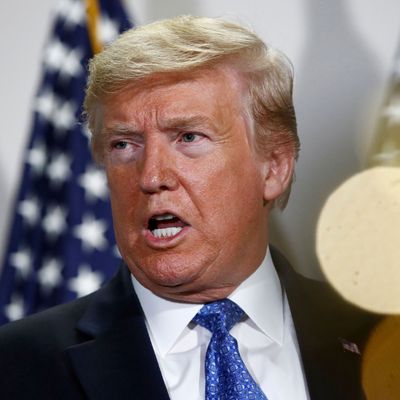
Most of the debate over a new coronavirus stimulus measure involves new assistance that Democrats think the country needs and that Republicans oppose on grounds that such past legislation as the $2.2 trillion Cares Act needs to be fully implemented before Congress takes further action. So it’s one party wanting to act, and another wanting to “pause” (except for the complication that Republicans really, really want a liability shield for corporations).
Trouble is, Republicans are also very interested in taking away an existing stimulus measure that many of them opposed in the first place — the enhanced unemployment insurance designed to keep low-income Americans from a disastrous drop in living standards in anticipation of a big boost in joblessness. There was a lot of fretting in the Senate that the $600-per-week federal add-on to UI benefits in the CARES Act might enable low-wage workers in poorer states to make more money on unemployment than they did in the jobs they had lost. That led to a floor revolt led by Republicans senators Ben Sasse, Lindsey Graham, Tim Scott, and Rick Scott to cap the payments at the level of past wages, which would vastly complicate what was intended to be a quick relief measure. It failed to achieve anything like the 60 votes necessary to amend the CARES Act at that point, but subsequently, Republicans troubled by all that extra money corrupting the morals of shiftless unemployment beneficiaries have been calling for “reforming” the measure.
Now it looks like the president is joining those in his party who believe the unemployment check is too damn high. According to Seung Min Kim of the Washington Post, “Trump on Tuesday privately expressed opposition to extending a weekly $600 boost in unemployment insurance for laid-off workers affected by the coronavirus pandemic,” per three sources. It’s unclear whether Trump simply wants to cap or lower payments, or let the federal UI enhancement lapse altogether.
Either way, you have to wonder why a president with no fixed philosophy of the federal government’s role in the economy would do anything to reduce stimulus efforts since a rapid recovery is generally deemed vital to his reelection. It’s not like Donald Trump is worried about deficits and debt — if he could fly Marine One around the country and personally throw big Trump-branded sacks of cash out of an open door, he probably would.
What makes the UI issue different from other forms of federal stimulus spending, however, is that it’s precisely the sort of thing Trump’s CEO buddies probably care about just as much as free-market ideologues do. High UI benefits, like high minimum-wage levels, threaten the fundamental power imbalance that serves as the silver lining for business owners during a deep recession. If they could get away with it, they might promote lower UI benefits —and minimum wages — in an emergency like this to ensure a robust buyer’s market for labor.
Trump’s own motives on this issue might be colored even more by his desire to declare the coronavirus pandemic over, and the economy in full recovery. You don’t need enhanced UI benefits if the economy is racing back towards full employment and will soon once again be the greatest economy in the history of the human race, at least in Trump’s mind. Clearly the president thinks the pandemic is a mere interruption — engineered by China and its globalist stooges — in his march toward a second term and perhaps a new carving on Mount Rushmore. At the earliest possible juncture, he’ll favor a resumption not just of normal life but of normal, pre-recession economic and labor policies.
Unfortunately, wishing the pandemic and its economic effects are over doesn’t make it so, and cutting off enhanced UI could make that happy day more remote, some economists believe:
But if “Mission Accomplished” is where Trump intends to pivot in the weeks ahead, he will have the eager support of Republicans who really do want to return to starving the federal government beast and enjoying all the deregulation the administration has quietly conducted as the hospital beds filled up.






























